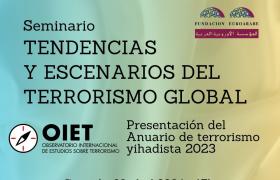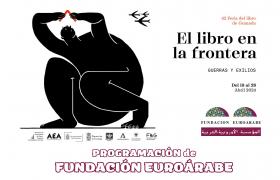International Congress
Sharia in the 21st Century - Challenges, Actors and Scenarios
Granada. 20th and 21st February 2020
Event organizer: Euroarab Foundation for Higher Studies
- Registration deadline: 18th February 2020.
-
Available languages: Arabic and Spanish (simultaneous interpretation service available)
On February 20 and 21, the Euroarab Foundation organizes the International Congress "Sharia in the 21st Century - Challenges, Actors and Scenarios" in its headquarters in Granada. Counting on the participation of different experts on this topic from European and arabic organizations and universities (Algeria, France, Morocco, Mauritania, Switzerland, Tunisia and the cities of Barcelona, Granada and Toledo in Spain).
In April 2013, the Pew Research Center’s Forum on Religion & Public Life published the results of The World’s Muslims survey: Religion, Politics and Society , conducted in Africa, Asia and Europe, in 39 different countries and territories. The first group of results addressed different aspects of the Sharia law: Sharia as divine revelation, its interpretation, to whom it should be applied, or its relationship with the national laws in those countries, among other issues. The vast majority of Muslims who live in Islamic countries were in favor of having the Sharia as the only legislation in their country, although the rate is different in each country: 99% in Afghanistan, 8% in Azerbaijan.
But what do we mean by Sharia? Is it a holistic, normative global system? A set of laws of divine inspiration? Is it the Islamic Law? Is it considered social justice? Many different definitions have been given throughout the history of Islam, some of them contradictory.
Therefore, we believe that this congress tackles a linguistic and historical approach to the concept of Sharia in order to reach a better understanding of how it is perceived in the 21st century and how it faces its main challenges. The global challenges which humanity is facing nowadays: climate change, globalization, social inequalities, violence, terrorism and xenophobia, including Islamophobia, its compatibility or incompatibility with modernity or postmodernity.
Quoting Kant, "practice without theory is blind and theory without practice is empty", thus we believe it is also necessary to analyze how Sharia has been put into practice throughout the history of Islam and its imbrication with non-Islamic legal systems.
But who is in charge of applying the Sharia? Who is qualified to discern what belongs or not to this normative system? That is why it is important to identify the main actors, individuals or institutions, who and which are responsible of this task by the concession of the Islamic society or by their own concession. At the same time, it is important to address where is it applied, since it is necessary to broaden the view and include other spaces, such as European societies, or Western societies in general, which are not mostly Muslim.
The congress, carried out by the Euroarab Foundation for Higher Studies within the framework of its Chair in Studies of Islamic Civilization and Renewal of Religious Thought, will address the following topics:
1.- Sharia: State, politics and democracy.
The modern state and the sharia, religious-political interactions, sharia in the political programs of Islamist movements.
2.- Sharia facing the global challenges of the 21st century.
The evolution of its goals throughout history, sharia and international relations, sharia and ecology, sharia and violence management.
3. Sharia and society: Ideal vs. reality - Is the Sharia an utopia?
Sharia throughout social transformations, Sharia and Islamic feminisms, human rights and individual freedoms in Islam, social justice and equality.
4.- Sharia and Islamic reforms - sacred text and modernity.
PROGRAM
Granada. 20th and 21st February 2020
THURSDAY, 20th February
INAUGURATION 9:00 – 9:30
First session. 9:30 – 11:30
SHARIA FACING THE GLOBAL CHALLENGES OF THE 21st CENTURY: HISTORY AND PERSPECTIVES
Moderator: Rafael Ortega
- Luz Gómez. Autonomous University of Madrid
Sharia: Descriptive, Prescriptive, Performative. For an intellectual history of Islamic modernity
- Hmida Ennaifer. Zitouna University, Tunisia
Sharia, History and Ethics. Cases of Muhammad Iqbal and WaelHallaq
- Abderrazak Belagrouz. University Sétif-2, Algeria.
The moral interpretation of Sharia in the present: how it is understood and which challenges it is currently facing
Debate
Break. 11:30 – 12:00
Second session. 12:00 – 14:00
INTERPRETATION OF SHARIA: VISION AND CONCEPT EVOLUTION
Moderator: Ana Silva
- Ahmed Bermejo. Imam, Barcelona
Sharia: origins, basis and objectives
- Leila Haddad. Lawyer, deputy and member of the Commission for Rights, Freedoms and Foreign Relations, Tunisia
Women between Sharia and Positive Law. The Issue of Equality in Inheritance
- Sidina Sidi Mohamed. Al-Hikma Forum, Mauritania.
Sharia between the 17th and the 21st centuries: uses of the term and evolution of its meaning
Debate
Third session. 18:00 – 20:00
SHARIA AND STATE: BETWEEN THEORY AND PRAXIS
Moderator: Inmaculada Marrero
- Said Bensaid Alaoui. Mohammed V University of Rabat, Morocco
Sovereignty and Sharia
- Lidia Fernández Fonfria. University of Salamanca and Toledo School of Translators
Sharia in Morocco in the 21st century: official institutions and main actors
- Rachid Guedira. Ibn Zohr University, Agadir, Morocco
Sharia and the Constitutions of the Political and Administrative Systems of North Africa and the Middle East. Comparative study
Debate
FRIDAY, 21st February
Fourth session. 9:30 – 11:30
SHARIA, IDEAL VS. REALITY: SOCIETY AND AGENTS
Moderator: Elena Arigita
- Tareq Oubrou. Imam of the Great Mosque of Bordeaux, France
French Islam: from Islam in a secular context to the secularism of Islam
- Abderrahim Anbi. Ibn Zohr University, Agadir, Morocco
Women in the Moroccan society and their role in the development of the family economy: Challenges and recognition of rights
- Brahim Iguizoul. University of Granada
Sharia and contemporary Salafist movements: the awaited change
Debate
Break. 11:30 – 12:00
Fifth session. 12:00 – 14:00
SHARIA, RIGHTS AND CITIZENRY
Moderator: Luz Gómez
- Elena Arigita. University of Granada
Sharia and citizenry in Spain: religious authority, regulatory frameworks and transnational dimension
- Mohamed Abdelouahab Rafiqui. Former imam in Casablanca, Morocco
Sharia and law: problems of the concept and conditions of reality
- Elham Manea. University of Zurich, Switzerland
Islamic Law in the West: The case of Britain
CONCLUSIONS AND CLOSING. 14:00 – 14:30
- Pilar Aranda, Dean of the University of Granada
- Inmaculada Marrero, Executive Secretary of the Euroarab Foundation
- Inés Mazarrasa, Director of the Pluralism and Coexistence Foundation
MANAGEMENT:
- Inmaculada Marrero Rocha. Professor of International Relations and Public International Law, University of Granada
- Rafael Ortega Rodrigo. Professor of the Department of Semitic Studies, University of Granada
REGISTRATION
- Registration deadline: 18th February 2020.
- Seating is limited to the maximum capacity of the auditorium - (75 people).
- Available languages: Arabic and Spanish
- University credits requested to the University of Granada. The resolution of this petition will be informed in the conference.
- Registration costs: 10 €
- Requirements: Fill in the registration form attached and submit it to the Foundation in person or via e-mail (cursos
fundea.org). Then wait for your admission.
- Payment: Once the Euroarab Foundation confirms the admission of your registration, you will have to deposit 10 € in its bank account (ES48 3183 1800 1910 0472 0023, ARQUIA), with your name and CONGRESO SHARIA as the concept. After making the deposit, you will have to send a proof of payment to the e-mail address above (cursos
fundea.org).
NB: Do not pay before the admission is received.
















